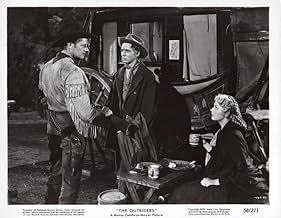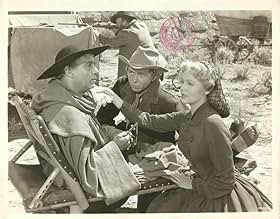In 1865, three escaped Confederate POWs are coerced into joining an offshoot of Quantrill's raiders who are planning to rob a Union gold shipment concealed in a civilian wagon train going fr... Read allIn 1865, three escaped Confederate POWs are coerced into joining an offshoot of Quantrill's raiders who are planning to rob a Union gold shipment concealed in a civilian wagon train going from Santa Fe to St. Louis.In 1865, three escaped Confederate POWs are coerced into joining an offshoot of Quantrill's raiders who are planning to rob a Union gold shipment concealed in a civilian wagon train going from Santa Fe to St. Louis.
Dorothy Adams
- Farmer's Wife
- (uncredited)
Gregg Barton
- Outrider
- (uncredited)
Dale Belding
- Farmer's Son
- (uncredited)
Rudy Bowman
- Prisoner
- (uncredited)
Steve Brown
- Boy Telling About the War
- (uncredited)
Buck Bucko
- Wagon Driver
- (uncredited)
Noble 'Kid' Chissell
- Prisoner
- (uncredited)
David Clarke
- Ross
- (uncredited)
Gene Coogan
- Outrider
- (uncredited)
Storyline
Did you know
- TriviaPrologue: "Camp Benton, Missouri - a Union prisoner stockade in the last year of the War Between the States."
- GoofsWhen Will puts Jen's shoes on her, she is wearing sheer stockings. In the 19th Century, since hemlines were ground level, and ankles could not be seen, sheer stockings would have been pointless. Silk and rayon stockings only came about in the 1920's (and nylon in the 1940's) when hemlines rose and showed off a woman's ankles and calves. In the 1860, women's stockings would have been either wool or cotton, and what Jen is wearing when Will puts her shoes on her feet are sheer and NOT wool or cotton.
- Quotes
Clint Priest: Me, I kinda relish gettin' old... takes the bother out of livin'.
- ConnectionsReferenced in Watch the Birdie (1950)
Featured review
The Outriders fulfills its genre with minimal expense but maximal outcome. Only a few brief frames appear spectacular, and many of the pleasures are among the overlooked qualities of the mid-20c Western: laconic dialog, complex plotting, psychological challenges, friendships and honor tested. The budget and production values are always restrained, but the strength of the studio system shows in excellent lighting and color plus a number of realistic outdoor scenes blending finely with studio effects. Other reviewers noted the convincing mattes of Santa Fe, but I felt almost intoxicated by the deep blue sky-backdrop to the camping scene that turns from a comic riot to a dance of love.
The other virtue of the studio system is the stable of professional actors who perform their roles not to steal scenes but in service of the plot. Joel McCrea may excel even Randolph Scott in saying the most with the least words while never ever lying--the Western-hero actors of their generation internalized completely the cowboy as a latter-day knight, and the alchemy of script and star is fascinating. Arlene Dahl may be even more economical with her speech than McCrea. In the central dance scene she speaks not a word until a critical moment, then agrees to dance with McCrea only if he bows to put fresh shoes on her feet. The scene is all about sex, but the actors, the script, the direction, and the genre completely control the sexuality's expression.
In the supporting ranks James Whitmore, not yet 30, is convincing as an old-coot warrior-sidekick with kidney trouble, while Ramon Navarro--a former sex symbol entering his 50s--plays a Mexican padrone who's still got chops. Barry Sullivan and Jeff Corey remain menacing even when they're acting cooperative. Claude Jarman, Jr. is always worth watching but the director or editor seemed to forget he was in the movie.
I couldn't stop watching, but the less-enthusiastic reviewers have a point. The film fulfills its genre so professionally that it never falls below a certain level. But those same qualities make its most beautiful moments somewhat understated, like something even better might once have been imagined but for now they need to finish a movie.
The other virtue of the studio system is the stable of professional actors who perform their roles not to steal scenes but in service of the plot. Joel McCrea may excel even Randolph Scott in saying the most with the least words while never ever lying--the Western-hero actors of their generation internalized completely the cowboy as a latter-day knight, and the alchemy of script and star is fascinating. Arlene Dahl may be even more economical with her speech than McCrea. In the central dance scene she speaks not a word until a critical moment, then agrees to dance with McCrea only if he bows to put fresh shoes on her feet. The scene is all about sex, but the actors, the script, the direction, and the genre completely control the sexuality's expression.
In the supporting ranks James Whitmore, not yet 30, is convincing as an old-coot warrior-sidekick with kidney trouble, while Ramon Navarro--a former sex symbol entering his 50s--plays a Mexican padrone who's still got chops. Barry Sullivan and Jeff Corey remain menacing even when they're acting cooperative. Claude Jarman, Jr. is always worth watching but the director or editor seemed to forget he was in the movie.
I couldn't stop watching, but the less-enthusiastic reviewers have a point. The film fulfills its genre so professionally that it never falls below a certain level. But those same qualities make its most beautiful moments somewhat understated, like something even better might once have been imagined but for now they need to finish a movie.
- FosterAlbumen
- Dec 24, 2011
- Permalink
- How long is The Outriders?Powered by Alexa
Details
Box office
- Budget
- $1,621,000 (estimated)
- Runtime1 hour 33 minutes
- Aspect ratio
- 1.37 : 1
Contribute to this page
Suggest an edit or add missing content






































